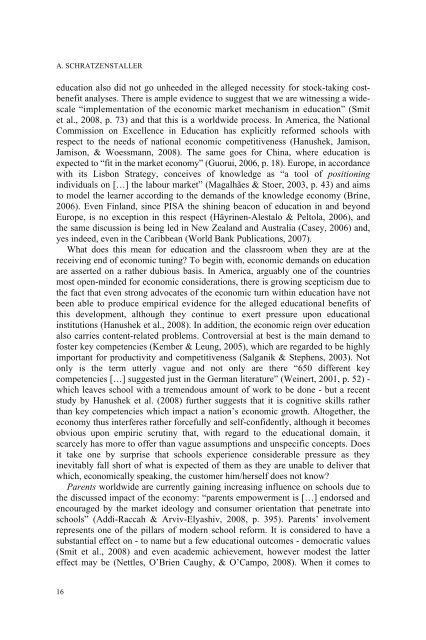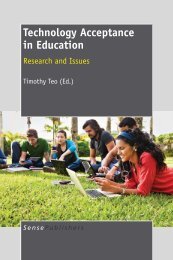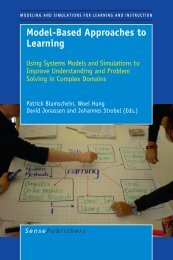Classroom of the Future - Sense Publishers
Classroom of the Future - Sense Publishers
Classroom of the Future - Sense Publishers
Create successful ePaper yourself
Turn your PDF publications into a flip-book with our unique Google optimized e-Paper software.
A. SCHRATZENSTALLER<br />
education also did not go unheeded in <strong>the</strong> alleged necessity for stock-taking costbenefit<br />
analyses. There is ample evidence to suggest that we are witnessing a widescale<br />
“implementation <strong>of</strong> <strong>the</strong> economic market mechanism in education” (Smit<br />
et al., 2008, p. 73) and that this is a worldwide process. In America, <strong>the</strong> National<br />
Commission on Excellence in Education has explicitly reformed schools with<br />
respect to <strong>the</strong> needs <strong>of</strong> national economic competitiveness (Hanushek, Jamison,<br />
Jamison, & Woessmann, 2008). The same goes for China, where education is<br />
expected to “fit in <strong>the</strong> market economy” (Guorui, 2006, p. 18). Europe, in accordance<br />
with its Lisbon Strategy, conceives <strong>of</strong> knowledge as “a tool <strong>of</strong> positioning<br />
individuals on […] <strong>the</strong> labour market” (Magalhães & Stoer, 2003, p. 43) and aims<br />
to model <strong>the</strong> learner according to <strong>the</strong> demands <strong>of</strong> <strong>the</strong> knowledge economy (Brine,<br />
2006). Even Finland, since PISA <strong>the</strong> shining beacon <strong>of</strong> education in and beyond<br />
Europe, is no exception in this respect (Häyrinen-Alestalo & Peltola, 2006), and<br />
<strong>the</strong> same discussion is being led in New Zealand and Australia (Casey, 2006) and,<br />
yes indeed, even in <strong>the</strong> Caribbean (World Bank Publications, 2007).<br />
What does this mean for education and <strong>the</strong> classroom when <strong>the</strong>y are at <strong>the</strong><br />
receiving end <strong>of</strong> economic tuning? To begin with, economic demands on education<br />
are asserted on a ra<strong>the</strong>r dubious basis. In America, arguably one <strong>of</strong> <strong>the</strong> countries<br />
most open-minded for economic considerations, <strong>the</strong>re is growing scepticism due to<br />
<strong>the</strong> fact that even strong advocates <strong>of</strong> <strong>the</strong> economic turn within education have not<br />
been able to produce empirical evidence for <strong>the</strong> alleged educational benefits <strong>of</strong><br />
this development, although <strong>the</strong>y continue to exert pressure upon educational<br />
institutions (Hanushek et al., 2008). In addition, <strong>the</strong> economic reign over education<br />
also carries content-related problems. Controversial at best is <strong>the</strong> main demand to<br />
foster key competencies (Kember & Leung, 2005), which are regarded to be highly<br />
important for productivity and competitiveness (Salganik & Stephens, 2003). Not<br />
only is <strong>the</strong> term utterly vague and not only are <strong>the</strong>re “650 different key<br />
competencies […] suggested just in <strong>the</strong> German literature” (Weinert, 2001, p. 52) -<br />
which leaves school with a tremendous amount <strong>of</strong> work to be done - but a recent<br />
study by Hanushek et al. (2008) fur<strong>the</strong>r suggests that it is cognitive skills ra<strong>the</strong>r<br />
than key competencies which impact a nation’s economic growth. Altoge<strong>the</strong>r, <strong>the</strong><br />
economy thus interferes ra<strong>the</strong>r forcefully and self-confidently, although it becomes<br />
obvious upon empiric scrutiny that, with regard to <strong>the</strong> educational domain, it<br />
scarcely has more to <strong>of</strong>fer than vague assumptions and unspecific concepts. Does<br />
it take one by surprise that schools experience considerable pressure as <strong>the</strong>y<br />
inevitably fall short <strong>of</strong> what is expected <strong>of</strong> <strong>the</strong>m as <strong>the</strong>y are unable to deliver that<br />
which, economically speaking, <strong>the</strong> customer him/herself does not know?<br />
Parents worldwide are currently gaining increasing influence on schools due to<br />
<strong>the</strong> discussed impact <strong>of</strong> <strong>the</strong> economy: “parents empowerment is […] endorsed and<br />
encouraged by <strong>the</strong> market ideology and consumer orientation that penetrate into<br />
schools” (Addi-Raccah & Arviv-Elyashiv, 2008, p. 395). Parents’ involvement<br />
represents one <strong>of</strong> <strong>the</strong> pillars <strong>of</strong> modern school reform. It is considered to have a<br />
substantial effect on - to name but a few educational outcomes - democratic values<br />
(Smit et al., 2008) and even academic achievement, however modest <strong>the</strong> latter<br />
effect may be (Nettles, O’Brien Caughy, & O’Campo, 2008). When it comes to<br />
16














